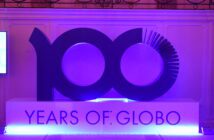Kiss is as much a brand as a rock band, and its commercial mastermind Gene Simmons has his finger in plenty of other media pies too, including television.
Simmons made waves around the world with his comments on piracy at MIPCOM 2010, but today he took to the MIPTV stage as an interviewer: grilling Entertainment One president and CEO Darren Throop for a Media Mastermind keynote session, while also showing off new reality show, Busted.
They started by talking about their shared background in the music industry, and how that applies to eOne’s strategy today.
« Music has seen some very tough times, and that’s why a modern media business needs to exist in more than one place, » said Throop. « Music really was the digital revolution’s guinea pig, but now for the first time since 1999 we’re seeing growth… Maybe music will even support the other parts of our business in the future, and that’s the basis of our integrated model. »
« Is TV bigger than movies these days? » asked Simmons, citing Mad Men, Game of Thrones and The Walking Dead. « It seems that these sorts of shows are even more important than movies. Is that so? »
Throop noted that an increasing amount of talent is moving over, while TV has adopted « many of the same financing and funding models » from the film world. « As parts of the film world are facing extreme challenges, the TV drama business is booming. I’ve heard a lot of people say TV is the new film, or at least the new indie film, so it’s an incredible time… The golden age of scripted television is what I’m hearing. »
Throop suggested that success in one medium increasingly breeds success in another, whether that’s film to TV, or music to TV as in Simmons’ case.
Why doesn’t eOne make more reality shows? wondered Simmons. Throop said that it’s expanding in this area « and we may buy a company or two to give us a foothold in that space ». But Simmons also asked whether kids still care about TV nowadays.
« They’re looking at content and shows on their phones, their iPads and other stuff. And all at the same time, » he said, referring to his own children. « What’s going on? »
« They do care about TV and they want to watch it all and they want to watch it everywhere, » said Throop. « Media needs to be multi-platform to make the economics work, and then the content needs a partner like eOne to exploit it across all mediums. »
He noted that there are new digital services launching and licensing content every month, but Simmons wondered if the demand for new programming will keep up.
Throop suggested that there needs to be consolidation, for example among subscription-based streaming TV services. « Ultimately there has to be. I don’t think consumers want five or six different subscription services or five or six different bills. »
He went on to note that there’ll be 400 million smart TVs in the world by the end of this year. « And they’re all coming loaded with widgets and apps directing people to content. So it’ snot about the old debate on whether content or distribution is king. The two do go hand-in-hand. »
That brings strong implications for producers, who Throop thinks should be working hard on making the most of technologies and trends like second-screen.
« It’s definitely about more than producing a series, delivering it and then getting on to the next one, » said Throop. « There are new ways of consuming content and new ways of measuring your success, and that impacts everyone here. »
He admitted that « today the money from digital doesn’t match what we were getting from the analogue world« , suggesting that the key to navigating the transition relies on companies being « set up properly… truly nimble and dynamic ».
Throop thinks that the music industry has figured this out. « In music, the shift to digital really lowered the record companies’ costs, » he said. « They realised finally how to set themselves up, it just took a little longer than it should have. »
He also talked about Peppa Pig as a good example of how content companies need to think in this new environment. « When we created it, we could never imagine that the Peppa Pig apps would surpass 1m downloads in the UK alone… And we’ve sold just in the UK more than 5m pairs of Peppa Pig shoes. And you can only do that once it’s a hit on TV. »
« How about a Kiss / Peppa Pig crossover joint venture? » asked Simmons at this point, noting that Kiss sells branded condoms and coffins. « We’ll get you coming and we’ll get you going, » he quipped. « I’m not sure how Peppa fits in the middle of that, » pointed out Throop. Indeed.
Simmons asked if somebody might buy eOne in the near future. « Management’s mandate for eOne is continued growth, » said Throop. « We could be approached, and we’ve been subject to those approaches before, and if somebody comes up with a bid, that’s out of our hands… But our current intention is much more about being the acquirer. »
Throop went on to talk about how acquiring Alliance Films has helped eOne’s international expansion plans, and reiterated that the company isn’t looking to be acquired. « We’re not building eOne to sell it, we’re building it to run it. »
In the Q&A session, Throop and Simmons were asked about the rise of brands like Angry Birds, which started on mobile devices and built huge fanbases, then started making TV shows and other content with their own distribution model – their apps.
« Angry Birds is a great example of how you can start with a game or an app, and transition that into a hugely successful licensing and merchandising business, » said Throop.
Simmons talked about a deal that never was with Rovio, the publisher of Angry Birds. « The CEO of Angry Birds was over at my house, we almost had a deal for Angry Kiss Birds, then he saw out of the corner of his eye the Kiss Hello Kitty, and that was the end of that, » he said.
« But you have to give them kudos for figuring out this distribution model… There are a lot of people out there with great ideas and visions, and they want to implement them. There is no one model any more, and Angry Birds is a great example of that. »




